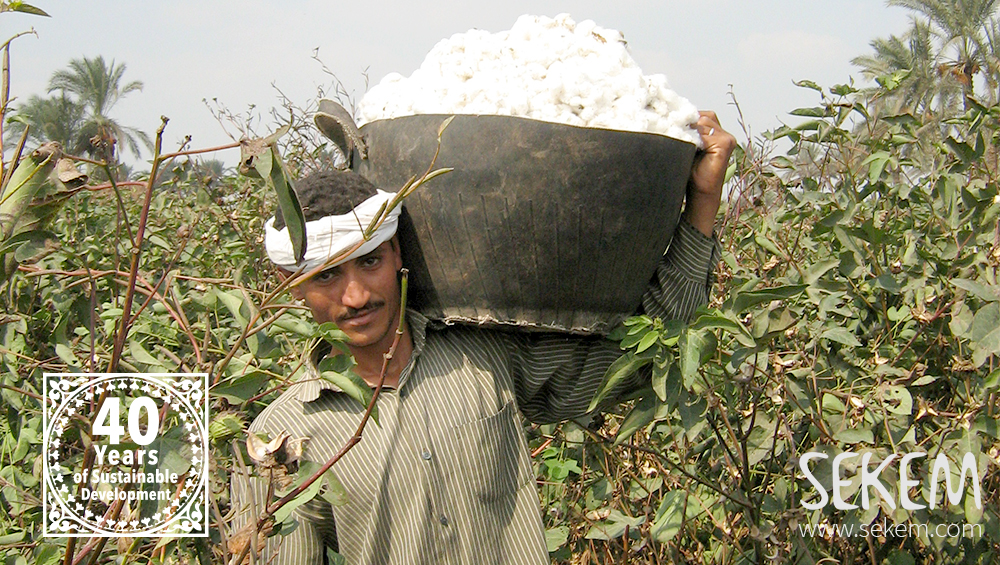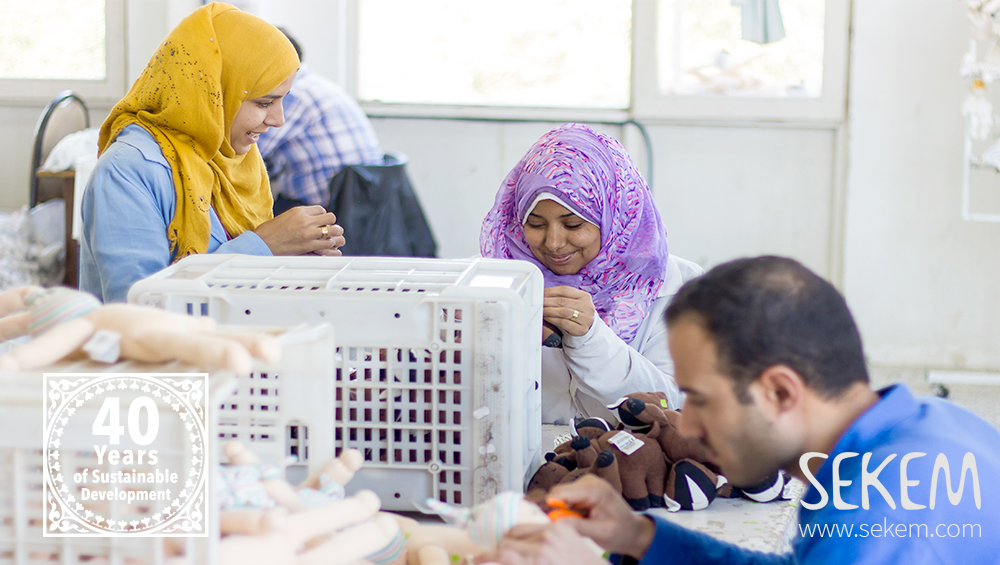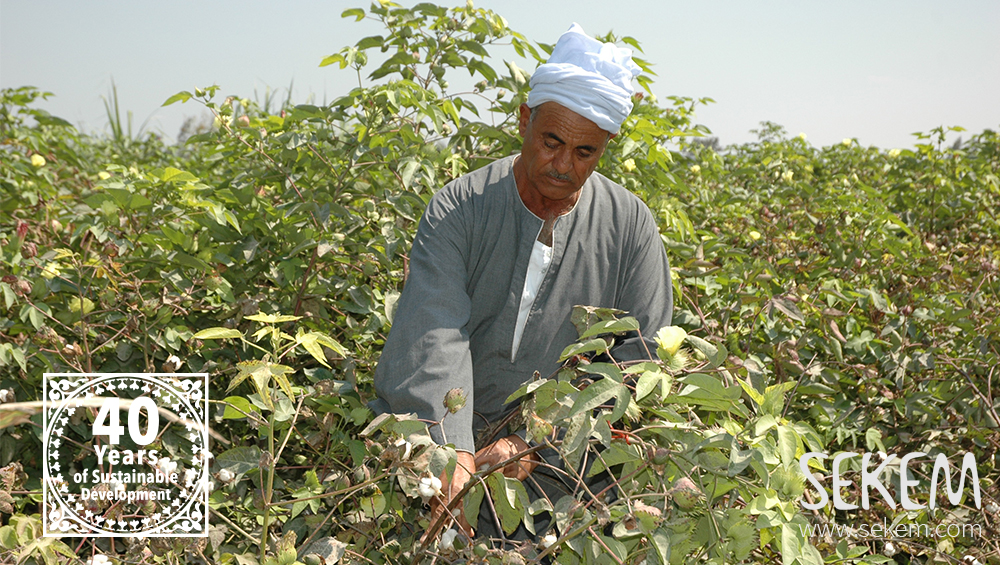Cotton is one of the oldest crops used in the world and is utilized to make textiles and clothes since more than 8000 years. The oldest tracks of cotton were found in Asia and South America. Today, cotton is still an important material and is cultivated all over the world. The main purchaser is the textile industry. However, cotton fibers are also used for example in tents, coffee filters and banknotes. From the cotton seed, even cooking oil can be extracted.
Unfortunately, cotton is considered as the agricultural product with the highest amount of chemicals. According to the United Nations, 18 percent of the chemical plant protection active ingredients are used worldwide in cotton fields. This leads to enormous problems for environment and people. Especially conventional cotton crops, which are often genetically modified, need a lot of pesticides. Moreover, the cultivation of cotton requires plenty of water: 2,000 liters are needed, for example, to irrigate the cotton shrubs for a single T-shirt, according to the UNESCO-Institute for Water Education. This is particularly problematic in countries suffering from water scarcity.
Sustainable agriculture in Egypt
A sustainable alternative is the cultivation of organic cotton. More and more farmers and companies worldwide realize the benefits and turn from conventional to organic or even biodynamic cultivation of cotton. One of these companies is the SEKEM Initiative in Egypt. Since almost 40 years, SEKEM is committed to produce, process and market Organic and Biodynamic foodstuff, textiles and phyto-pharmaceuticals in Egypt, the Arab World and on international markets. In 1977, Dr. Ibrahim Abouleish bought a piece of desert land and started to turn it into vital soil by applying Biodynamic agricultural methods. “Our fields are saving at least 20 percent more water and absorb an average of around three tons of CO2e per hectare and per year. This is a clear sign that Organic agriculture is a major contributor to combat climate change”, explains Helmy Abouleish, CEO of SEKEM. Today, the SEKEM Initiative has transformed more than 680 hectare of desert land for sustainable agriculture and built up a place where people are living, learning and working in a responsible community and where all economic activities are done in balance with cultural, societal and ecological activities.

SEKEM was one of the first initiatives, which started to grow and process organic cotton in Africa. In 1990, Dr. Ibrahim Abouleish with his team of researchers proofed the efficiency and the high crop yield of the alternative and sustainable way, which made the Egyptian government to change the law, waiving the used method of spraying chemical pesticides by plane on cotton fields. Accordingly, the overall use of pesticides in Egypt has declined by almost 90 percent. In the same year, SEKEM also encouraged the foundation of the Centre of Organic Agriculture in Egypt (COAE) as an independent certification body, working in accordance with Demeter guidelines and later the European Regulation for Organic Agriculture. Many African countries, such as Tanzania, Uganda and Benin, followed the example of SEKEM and Egypt and started to produce organic cotton in the 90s as well.
“Increase awareness about sustainable agriculture”
During the following years, SEKEM developed a holistic, biodynamic concept for organic cotton cultivation in close co-operation with scientists, farmers, consultants and consumers. To support farmers to shift from conventional to Biodynamic cultivation of cotton and other plants, SEKEM founded the Egyptian Biodynamic Association (EBDA). The EBDA is cooperating with approximately 400 farms all over Egypt. Together with SEKEM, the EBDA ensures that the farmers get stable prices for their products and herewith enabling them to have the security to not end up with empty hands or even debts. Furthermore, the EBDA is helping to construct sanitary installations, providing water filters or safety trainings. This helps to reduce health damages among the population. “Our major objective is to increase awareness about the added values of sustainable agriculture and to foster the positive outcome of this among the farmers”, says Attia Mohamed Sobhy, Secretary of the EBDA.
In 1994, SEKEMs company NatureTex was established to produce organic textiles using the high quality staple organic cotton. The company manufactures various products, made out of 100 percent certified Organic cotton or linen, including underwear and sleepwear for babies and children, casual clothes for adults, accessories, dolls, and home textiles. The short production chain and the processing according to the Global Organic Textile Standard (GOTS), helps to keep the ecological impact very low. Thereby, its economic activity ensures that the environment is not harmed, that people who create the value receive a fair income and work in proper conditions and that those, who use the products benefit from the high quality.

GMO isn’t the solution
According to the German “Informationsdienst Gentechnik”, approximately 73 percent of the worldwide cultivated cotton is genetically modified. Through genetically engineering, a bacterium is incorporated into the cotton plant. This produces a poison that is supposed to kill the larvae of the cotton capsule drill, but at the same time aphids and stink bugs reproduce splendidly, which leads to the use of further pesticides. Organic and Biodynamic farming principles represent an alternative to conventional or genetically modified agriculture methods and are, in the long run, even more cost-effective. This emerges from a recently published study, realized by the Heliopolis University for Sustainable Development. The research counts up the costs emerging out of the pollution of water and soil when cultivating crops such as cotton, corn or rice. It concludes that, although organic agriculture has slightly higher direct input costs for production, it enables a reduction of the environmental and health damage costs, and therefore, results in better cost effectiveness and profitability in the long term for society as a whole.
Change of thinking
In order to change the current situation, consumers must develop awareness about the problems that conventional cultivation of cotton brings with it. As long as they continue to buy the cheaper, conventionally produced textiles, the organic cotton products remain in the shelves. ‘‘Each one should question the own consumption and ‘throwaway’-society“, says Hannes Jaenicke, a German actor who is strongly engaged to protect the environment. “I have travelled around the world and witnessed what kind of damage the economy of the industrialized countries causes all over the globe. The problem is still far too little discussed and the policy delegates the topic aside.”
It becomes clear that it is time for a change of thinking. Consumers need to develop more awareness for how the cotton, that their clothes are made of, is grown, because otherwise, further generations have to pay the price for the damage caused by conventional agriculture.
Nils Daun
SEKEMs Contracted Farmers Telling of Responsibility, Opportunities and Challenges of Agriculture in Egypt.
The Future of Agriculture in Egypt: Comparative Study on the True Costs of Organic and Conventional Food Production.
Read the Whole Interview of Hannes Jaenicke with SEKEM News.

